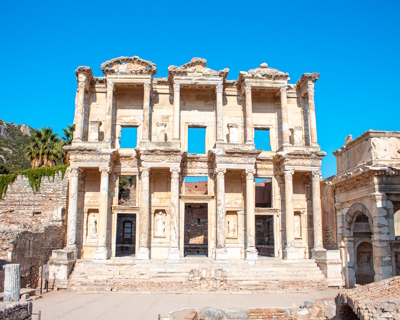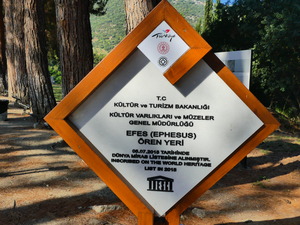Ephesus

Ephesus contains successive settlements from the Neolithic, Hellenistic, Roman, Byzantine, Selçuk and Ottoman periods.
The site started out as a sanctuary for Artemis, here worshipped as the mother goddess. Its main surviving monuments date from the Hellenistic and Roman Imperial periods, with religious and public buildings decorated with wall paintings, mosaics and marble panelling. The area also includes Cukurici Mound (a Neolithic settlement) and the Christian pilgrimage sites of the Church of Mary and the Basilica of St. John.
Community Perspective: Focus on the main site, with the restored façade of the Library of Celsus, the large theater and the wall paintings and mosaics of Terrace House 2. The Christian sites are “interesting but far from breathtaking”.


Map of Ephesus
Community Reviews
Nan

In his review, Jay highlights the high quality of the Turkish tentative list, being surprised that Ephesos, one of the most iconic Greco-Roman archaeological sites, was only inscribed in 2015. I have to agree with him, and it speaks volumes to the quality of Turkey's tentative list. Ephesos highlights are the library, the agora, and the mosaics. It also includes the ruins of the Temple of Artemis, one of the seven wonders of the world, and documents a long period of settlement from the Neolithic to Medieval times:
- The Cukurici Mound, located a bit south of the town, covers the Neolithic origins of the site.
- The ruins of the Temple of Artemis represent a high point of the classical and Hellenistic period.
- The main archaeological site is primarily Roman, with the Odeon, the Library, and the Terrace Houses with their mosaics being the prime structures.
- The Chapel of St Mary, from late antiquity, signifies Ephesus’s prominent role in early Christianity.
- The castle and the church are Byzantine. While these may feel underwhelming when compared to the archaeological site, these components round up the overall historic picture of the site and should at least warrant a short visit.
The area was settled for a long time due to the harbour, which made it a principal trading port and a rich agricultural hinterland. However, in the later Roman period, it silted up, leading to the city’s long decline. Today, Selcuk is a small provincial town, and Izmir, ancient Smyrna, is the main trade port on the Aegean.
The most memorable structure in the archaeological site is the reconstructed library facade. Despite ongoing discussions about restorations, the Austrian archaeologists have done a splendid job, making the site and its history more tangible.
When I visited (Dec 2021), extensive works were ongoing on the amphitheatre, filling gaps with modern concrete structures (see the crane in my picture). Despite potential concerns about the intrusiveness of the new construction, the view from the high ranks down to the agora and the central road with its pillars is impressive.
To sum it up, I have to agree with Digits: Even for those who have seen plenty of Roman ruins before, a visit to Ephesos will be a great experience.
Getting There
Ancient Ephesus is in modern day Selçuk. You can reach it from Izmir and Denizli by bus and occasional trains. I came from Izmir by train and also left for Denizli by train.
In town, there are minibuses touring the road to Kuşadası on the coast, also stopping at the main entrance to Ephesus. I couldn't quite figure out the schedule, so I walked. There is a large sidewalk, so no issues and the Temple of Artemis, the former world wonder, lies in between.
Being on foot, I skipped the Southern parts, i.e., the Mounds and the Chapel.
While You Are There
The larger area holds plenty of tentative sites (Kaunos!) and several great world heritage sites in Pergamon, Aphrodisias, and Pamukkale. Depending on the Greek-Turkish border situation and tourist season, you may also catch a ferry to Samos. At my time (off season), there were border tensions and I hadn't been aware of the option.
Digits

We visited Ephesus in the spring of 2013 on a private guided tour from Izmir.
We first made a quick stop at the House of the Virgin Mary. A walk up a wooded path leads to a small brick building. The three memories which come to mind are pilgrims placing thin lit candles outside, the water running out of the house believed to have healing powers, but mainly the tour guide suspiciously spying on her boyfriend simultaneously giving a tour to a single woman! On the way down, there is a lovely view over the landscape, with Ephesus tucked in below the hillside.
After the main event (but before the obligatory tour guide trip to a rug factory!), we were brought to the (few) remains of the wonder-of-the-world Temple of Artemis, with mosque-and-castle views in the background.
We entered a temperate, busy but not-overcrowded Ephesus at the south entrance. I remember being fascinated on the walk down the colonaded street at the explanations of the guide on the plumbing of the city, how the columns were manufactured and how far the sea had retreated from where it once was. As well as the aforementioned brothel carving, mosaics and other obviously more detailed artistic sculpture, we also enjoyed the Roman board game carved into the stone. A well preserved Odeon was outshone for me by the even better preserved bathroom facilities!
The first crowning glory that the layout of Ephesus leads you to is the Library, which, as I understand it, is the largest extant Roman library in the world. I suspect that even for a seasoned Roman ruins traveller, it would still be memorable. The second highlight is the massive theatre seemingly taking over the whole hillside with a good section of the stage still preserved. We left then through the more northerly entrance. A more detailed visit was probably in order but it was our last day and when one is at the mercy of the tour guide …
The outstanding value here is reflected in, as the UNESCO text puts it, the “grand monuments of the Roman Imperial period".
Clyde

I visited this WHS in Spring 2021. The main location is definitely the Ancient Site of Ephesus, but there are three other locations which make up this WHS which can be considered as minor site by comparison.
Before visiting the Ancient Site of Ephesus, I invested some time to try to cover the three minor locations which make up this WHS. A panoramic viewpoint of the Ayasoluk Hill, the Artemision (or Temple of Artemis) and the Medieval Settlement location is reachable just off the main road before reaching the Ancient Site of Ephesus. It is also part of the Via Sacra Artemis. The Ayasoluk Castle and the Basilica of Saint John require quite an expensive ticket for what you get too see so if you're pressed for time and money, I would skip it. On the other hand, just behind the castle, I could visit the Isa Bey Mosque for free. I really liked the few original remaining turquoise tiles inside but even the most keen enthusiasts would find it difficult to classify this site as WH material.
The Artemision was the most important sanctuary of Ephesus. The massive Temple of Artemis counted as one of the Seven Wonders of the Ancient World. Not much remains of this temple which was later converted to a church, apart from massive pillars which have been currently taken over by storks. The remains of the aqueduct go through the urban area of modern Selcuk and are also taken over by stork nests.
Way uphill, just after one of the entrances and parking areas to the Ancient Site of Ephesus, you'll get to the House of the Virgin Mary (another very expensive ticket is needed inclusive of parking). When we visited, the site was protected with a high security clearance and we had to get through a military checkpoint and a police checkpoint before accessing the site proper. Just before the House of the Virgin Mary, there is a big statue of the Virgin Mary and opposite the statue is a small resting area. From here you'll get a good panoramic viewpoint over the third location known as Cukurici Holuk or Mound, nicknamed the oldest settlement in Western Turkey and the Aegean region. The recent excavations in the hillside resulted in several remains such as tools, copper items and pottery mainly from the Neolithic and Bronze Ages. As much as five layers of sediments of mud-brick walls and multi-room residential units were found indicating several different settlements inhabited the area. This period of settlements was most probably destroyed by an earthquake and never built again. From the panoramic viewpoint, nothing much remains of the mound, just a sizeable clearing among the cultivated orchards, filled in and now overgrown foundation walls and a Turkish flag. Nonetheless, since the site is not fenced off, I made an extra effort to get to the exact coordinates on the UNESCO website. Apart from the thrill of getting there albeit risking a snake bite or ticks to make it through shoulder level overgrowth and bushes, there really is nothing there to see now.
Last but not least, I parked my car near the closest entrance to the huge theatre of Ephesus and made sure to be the first one to enter the site after the security guards. Parking here so early allowed me to see the main highlights practically alone for the first 45 minutes. I headed straight to the Library of Celsus, which is certainly the most well-known monument in Ephesus. On the way I spotted a quirky engraved Roman footprint which is believed to have been used to show the way to the brothel. The library can actually be interpreted as a heroon which was built between 100-110 AD over a burial chamber. A flight of nine steps at the facade, flanked by statue bases, led to a vestibule from which the actual library room could be accessed. The architecture of the impressive facade contrasts with the brick construction of the building's interior, although the floors and walls were revetted with marble. The library was completely destroyed during an earthquake in 270 AD and was not rebuilt. The splendid faced was re-erected as late as 1970-1978.
Curetes Street, one of the three main streets of Ephesus between the Hercules Gate to the Celsus Library. There were fountains, monuments, statues and shops on the sides of the street. There were also many houses on the slope which were used by the wealthy elite of Ephesus. Under the houses there were colonnaded galleries with mosaics on the floor which were located in front of the shops with a roof to protect pedestrians from the scorching sun or rain. Halfway uphill from the library, there is a big covered area of the slope with metal and plastic coverings which at first looked like quite an eyesore and I thought it was a temporary closed off area. However, upon closer inspection, it was a permanent installation to protect Terrace House 2.
The traces of a settlement on the northern slope of Mount Bulbul go back to the Archaic period (7th-6th century B.C.) when this area was used as a cemetery. During the Hellenistic period this slope was articulated with extensive terraces and in addition to this a detailed and unstructured development was built. Terrace House 2 nowadays is a 4,000 m2 rental house for several parties. Over three terraces, six separate residential units with separate entrances were originally constructed. Make sure to pay for the full entrace ticket to visit this special place with fine wall paintings and mosaics from the 2nd and 3rd centuries. The best wall paintings are those in Rooms 12a and 16a, accompanying everyday life according to the function of the rooms. The rooms have beautiful decorative elements such as false marble and figurative scenes of birds, muses, philosophers, etc. making the place look as if it were a mere few kilometres from Ancient Rome. Another interesting aspect are the several graffiti on the wall paintings. These mainly show fighting gladiators, caricatures and animals. The graffiti include names of persons, poems and declarations of love. Especially interesting is a group of 30 items of everyday life including their prices.
The Ephesus Museum is worth visiting if only for the original Great Artemis statue among other marble highlights. UNESCO WHS plaques can be found at every location of this WHS (sometimes more than once), except the Cukurici Mound.
Frédéric M

I visited Ephesus on a two-week group tour of Turkey in July 2018. As everything was organized, I have done really few researches beforehand and I was happily surprised to discover such an impressive site! We spent two days in Selçuk. We had free time on the first afternoon and I used it to visit Saint John's Basilica, Isa Bey Mosque and Ayasoluk Kalesi. The second day was spent for a group tour to Ephesus, Artemis temple and Şirince (not inscribed) and a self-guided walk to Grotto of the Seven Sleepers (buffer zone) and House of the Virgin Mary.
Inscribed sites closer to Selçuk (Saint John's Basilica, Isa Bey Mosque and Ayasoluk Kalesi) are interesting but far from breathtaking. The Basilica was a very important site for the history of Christianity, but only a few columns and foundations remains. The same apply for Isa Bey Mosque. I know it's an important place, but the visit was not memorable. Selçuk is a nice city to visit. Ayasoluk Kalesi gave me the same feelings of a historically important place where few remain. All these three sites can be seen in the photo background. I really enjoyed the ruins of the aqueduct with its numerous nesting storks!
Ephesus old city is by far the highlight of this WHS. The library and both theaters are especially worth mentioning. Having a guided tour of the site was great. There's not much to see of Artemis temple. A single column made of many pieces remains and, again, storks nest on it (photo). Şirince, though it is not inscribed, was an interesting excursion for Selçuk. Learning about the population exchange between Greece and Turkey was great.
My walking self-guided tour to Grotto of the Seven Sleepers (buffer zone) and House of the Virgin Mary was fun as the views on the landscape are beautiful. Otherwise, both sites are, at best, boring. Only a few uninteresting brick constructions remain at the site of Virgin Mary's House. I don't believe neither of them should be within the core zone. You shouldn't take time to go there, unless the pilgrimage is important for you.
In sum, Ephesus is an amazing site and well deserve its late inscription on the list, but most of its OUV come from only one of the components I visited.
Jay T

Ephesus was one of the great cities of antiquity, and erstwhile home to the Temple of Artemis, one of the Seven Wonders of the Ancient World. After its harbor silted up, Ephesus lost value as a commercial center and never recovered. However, it left behind impressive ruins, which unfortunately don't include the Temple of Artemis. Ephesus is also important for Christian travelers, both for its Biblical history and as a pilgrimage site to the believed last home of Mary, the mother of Jesus. With such history I was surprised it took until 2015 for the city to become a World Heritage Site. I visited Ephesus in the spring of 2013, and thoroughly enjoyed wandering the ruins of the city. The restored façade of the Library of Celsus was magnificent, as was the large theater at the end of the former Harbor Street. Also on view were ancient baths, the agora, and a smaller Odeon theater. Although I didn't visit them, there was an archeological excavation of Terrace Houses on display for an additional fee. Ephesus was crowded with tour groups, but I didn't notice them because the city was so fascinating to explore.
Logistics: Ephesus is located near Selçuk, and can be reached by walking, biking, minibuses, or private transportation or tours. Ephesus is a popular stop for cruise ships, which often bring large tour groups.
Michiel Dekker
Beautiful site with a lot of history. Also the site of one of the seven wonders of the world; the Temple of Artemis (eventhough not much remains of this site).
Worth a visit and worthy to be a World Heritage Site.
Community Rating
- : David Berlanda Elisabeth Fransisca Situmorang Tony H. Ivan Rucek Craig Harder Mike Robert Luke LOU Hadrianus Can SARICA Dennis Nicklaus Reisedachs Christravelblog Bergecn Violeta Farinelli Ferhatdonmez Thomas Harold Watson Mikeyboyracer Fmaiolo@yahoo.com Mikita M Yevhen Ivanovych AGuzzo JR's HERITAGE SITES Alexandrcfif Oscar Wu Rafał Kałczuga Bossc Mia esguerra Lembu
- : Szucs Tamas Wojciech Fedoruk Chalamphol Therakul Zoë Sheng Argo RobRos Carlo Sarion Anne Byronb HaraldOest MoPython AT8 Aspasia Bruno_Pires Lukemarshall Javier
- : Philipp Peterer Martina Rúčková Geert Luiken Thibault Magnien Juha Sjoeblom Nan Randi Thomsen Svein Elias Jeffrey Chai Ran Stanislaw Warwas Jay T J. Stevens Kevin McFarland Adolfo Frédéric M Don Irwin BH Lichia Digits Tarquinio_Superbo Paola Laura Alikander99 Tikhon Puliaev Wieland Giannis75 Mazeman Gordon Mitchell Ljowers CeeMon Viaje al Patrimonio GerhardM J_neveryes Mo-han Je Felicité Balu93 Andrew_Kerr Ssong.x Wimmy CeeCeeSR Hughes1920
- : Els Slots Solivagant Hubert Clyde Lucio Gorla Philipp Leu Kbtwhs CugelVance Rich Forrest
- : Walter Alexander Parsons Csaba Nováczky Jon Opol
- : Kelseyyurek
- : Adrian Turtschi
Site Info
- Full Name
- Ephesus
- Unesco ID
- 1018
- Country
- Turkiye
- Inscribed
- 2015
- Type
- Cultural
- Criteria
-
3 4 6
- Categories
- Archaeological site - Ancient Greece
- Link
- By ID
Site History
2015 Inscribed
Site Links
Unesco Website
Official Website
In the News
Connections
The site has 38 connections
Constructions
Geography
History
Human Activity
Individual People
Religion and Belief
Science and Technology
Timeline
Trivia
Visiting conditions
WHS Names
WHS on Other Lists
Visitors
452 Community Members have visited.
The Plaque
 (photo by Clyde)
(photo by Clyde)